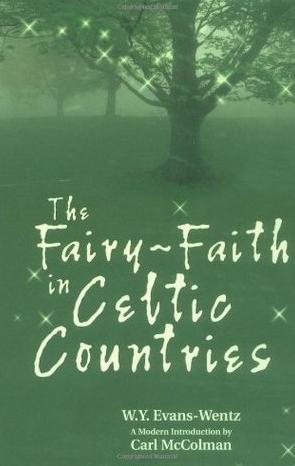Evans Wentz’s Quest for Fairies May 2, 2017
Author: Beach Combing | in : Modern , trackbackBeach has recently become interested in Walter Yeeling Evans Wentz (or Evans-Wentz as he became)* the American mystic who in his late twenties and early thirties researched Breton, British and Irish fairies, before running off to India to become a guru. Many readers will know Evans Wentz for his Fairy Faith In Celtic Countries, the single most bizarre book ever published by Oxford University Press. (Guys what were you thinking!?!) A serious problem has been the chronology of Evans Wentz’s time in the UK and France. After several hours of huffing and puffing, Beach now thinks that he has established the outline of Evans Wentz’s fairy hunting: he has used the published and unpublished works of Evans Wentz, but not the cache of documents at the Bodleian. He is then offering this chronology to readers or future Google searchers, hoping that others can build on it. If, by the way, you are reading about Evans Wentz for the first time his Fairy Faith (freely available online) is well worth a few hours.
Sept 1907 Wentz, aged 29, crosses the Atlantic to begin lessons at Oxford: he will become a resident at Jesus College. Wentz studies, for most of the academic year, the Arthurian legends with Oxford’s first professor of Celtic studies, John Rhŷs. Sometime in that year or immediately after (certainly prior to early 1909) Walter changes his surname to Evans Wentz to reflect his Celtic roots. ‘Evans’ came from his mother’s family.
March 1908 Evans Wentz has a chance meeting with Breton scholar and nationalist Anatole le Braz: the circumstances of this meeting are unclear, but this may have inspired Evans Wentz to turn his studies towards Brittany.
Summer 1908 Evans Wentz travels to Ireland, to Scotland, to Wales and to Brittany, collecting accounts from fairy believers. The order is unclear. Perhaps he ends in Brittany?
The 1908/1909 academic year Evans Wentz spends under the famous Celticist Joseph Loth in Rennes in Brittany, while remaining in contact with le Braz.
April 1909 he puts the finishing touches to his thesis (in English) for Rennes university on the Fairy Faith – he spends some ecstatic days at Carnac doing so – and in July he is successfully examined (in French).
By the early summer of 1909, aged 31, he is on the road again looking for more fairy accounts to supplement those gathered in his thesis. Up until very early 1910 he will travel in Brittany, Wales and Ireland. He will visit Cornwall and the Isle of Man for the first time. He will not go to Scotland again. The exact timetable of his travels is uncertain. However, he is Brittany in August, in Ireland in September, end September in Wales and possibly on Man in December (uncertain reference here). October in Cornwall or did Cornwall come after Man? My guess is October.
By early 1910 he is back at Jesus College in Oxford and is preparing his thesis on the fairy faith there. He is examined in May 1910 by John Rhŷs and Andrew Lang, two of the greatest scholars of the period.
June 1910 he is already preparing to publish his thesis as a book. By the end of the month he has agreements from John Rhŷs (Wales), Anatole Le Braz (Brittany), Alexander Carmichael (Scotland), Douglas Hyde (Ireland), Henry Jenner (Cornwall) and Sophia Morrison (Man) to write introductions for their respective Celtic nations in the Fairy Faith.
July 1910 he meets up with Andrew Lang in London to discuss aspects of his manuscript: probably at this date Lang also agrees to write a short paper for the book.
Autumn 1910 and winter/spring 1911 Evans Wentz prepares the manuscript and by April of 1911 he has an agreement to publish with Oxford University Press.
November 1911 the Fairy Faith finally comes out: Evans Wentz is 33. Reviews appear in late 1911 and early 1912 and will continue to appear in 1913.
In 1912, particularly late 1912 Evans-Wentz gives several talks on the fairy faith in London: his victory lap.
Early 1914 he travels to the continent and a new phase in his life begins, helped along by some inconvenient events in the summer of that year in Sarajevo, Berlin and on the Marne…
Beach would love to fill in gaps here. Beach has Evans Wentz’s French thesis but not his thesis from Oxford that seems not to have survived. Can anyone get anything else out of the maws of time? drbeachcombing AT yahoo DOT com The key are the Oxford documents. If any young pro-active man or woman with a Bodleian library pass is reading this…
*Boring but let’s get this out of the way. In The Fairy Faith it is Evans Wentz not Evans-Wentz, the hyphen seems to come later in Walter’s life. I’m following the unhyphenated spelling even if that should really mean that this is a post about Wentz rather than Evans Wentz.



